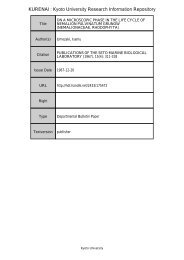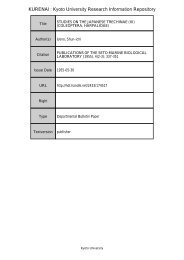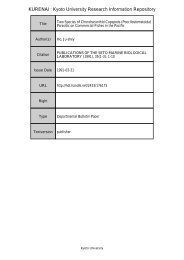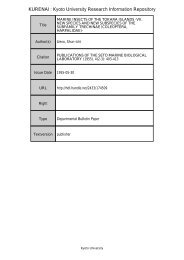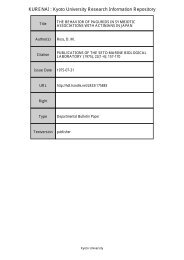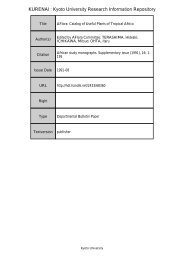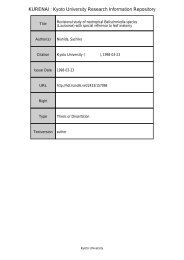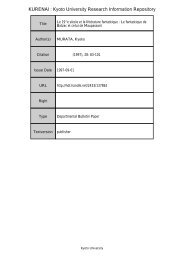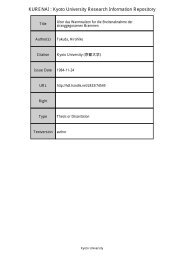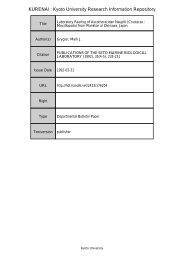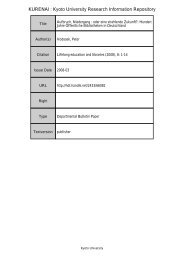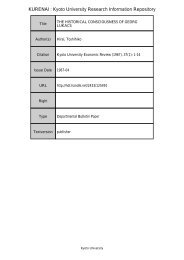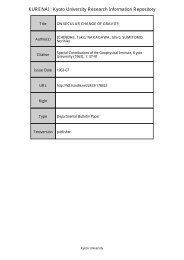Remaindered Life of Citizen-Man, Medium of Democracy
Remaindered Life of Citizen-Man, Medium of Democracy
Remaindered Life of Citizen-Man, Medium of Democracy
You also want an ePaper? Increase the reach of your titles
YUMPU automatically turns print PDFs into web optimized ePapers that Google loves.
東 南 アジア 研 究<br />
49 巻 3 号<br />
the question <strong>of</strong> an unfulfilled potential for democracy?<br />
Values <strong>of</strong> <strong>Citizen</strong>ship and Literature<br />
In The Junior <strong>Citizen</strong> in the Commonwealth, an elementary textbook written by Filipino<br />
educators and published in 1937, we are introduced to the political, civic and human ideals<br />
propagated under U. S. colonial tutelage through a fatherʼs instruction <strong>of</strong> his children in the<br />
duties and responsibilities <strong>of</strong> citizenship within the home [Fernandez and Carreon 1937]. From<br />
this domestic, paternal instruction, we learn first <strong>of</strong> all that national citizenship is the highest<br />
and most indispensable good. In the chapter, “Why It Is Bad Not To Have a Country,” Mr.<br />
Santos, the paternal figure, recounts to his son a story written in 1863 by an American patriot,<br />
Edward E. Hale, about the life-long misfortune <strong>of</strong> a man who betrays and disowns his country.<br />
The moral <strong>of</strong> the story, the father concludes, is “Aman cannot live happily without a country<br />
any more than a child can live happily without a home”[ibid.: 27]. Represented in the permanent<br />
exile suffered by “the man without a country,” alienation from the land <strong>of</strong> oneʼs birth is an<br />
intrinsic evil that is at once the crime and its punishment. Therefore, one should be ready to give<br />
up oneʼs life rather than to give up oneʼs country.<br />
“But what in our country is worth loving, living, and dying for?” the junior citizen asks his<br />
father. The father responds: “In the first place, it is the home <strong>of</strong> your father, mother, brother,<br />
sister, friends and all who are dear to you and to us all. In the second place, there are many<br />
things that our country gives us which cannot be paid for in terms <strong>of</strong> money. In the third place,<br />
there are many things in our country that we are proud to show to other people” [ibid.: 36]. In<br />
the fatherʼs more elaborated answer to the question <strong>of</strong> patriotic sacrifice, we have a digest <strong>of</strong><br />
some <strong>of</strong> the central socio-philosophical precepts that the commonwealth was to instill among<br />
Filipinos in their training for eventual citizenship under a democracy. On the one hand, we have<br />
a conception <strong>of</strong> oneʼs “country” as a form <strong>of</strong> inviolable belonging composed <strong>of</strong> indissoluble links<br />
tying together territory, natality, land, home, and relations <strong>of</strong> kinship and friendship. On the<br />
other hand, we have a conception <strong>of</strong> the value <strong>of</strong> oneʼs country (“worth loving, living, and dying<br />
for”) as composed <strong>of</strong> both the inalienable value and the exchange value <strong>of</strong> its nature, both human<br />
and non-human. The inalienable value <strong>of</strong> a countryʼs non-human nature is encapsulated by its<br />
comparative beauty, which is attested to by the admiration <strong>of</strong> people from other lands, and the<br />
comparative comfort <strong>of</strong> its agreeable climate. The inalienable value <strong>of</strong> a countryʼs human nature<br />
can be found in the degree <strong>of</strong> civilization and freedom achieved by its people, with the freedom<br />
<strong>of</strong> its people distinguished from independence as a nation and defined by liberal tenets <strong>of</strong><br />
individual freedom and equality under the rule <strong>of</strong> modern, secular law. 2) Its exchange value is<br />
466<br />
2) “AFilipino is free to live the way he wishes and to follow any occupation that suits him. He is free to<br />
select his friends. He may be poor and uneducated, but our laws are made to treat alike the poor and<br />
the rich, the ignorant and the wise” [Fernandez and Carreon 1937: 41]. This freedom is contrasted<br />
with countries like India, whose caste system, as a form <strong>of</strong> customary law, takes precedence over↗




